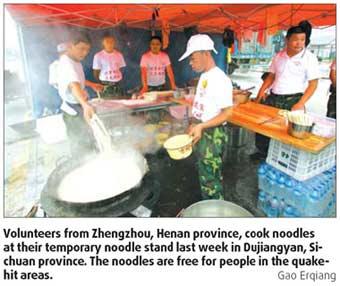China
Ordinary people who make a difference
Source: China Daily | 06-05-2008 16:28
Special Report: Strong quake jolts SW ChinaBEIJING, June 5 -- I met Yang Zhipeng and his 20-member team in Dujiangyan last Thursday, before that they had already visited the worst-hit areas of Beichuan, Anxian, Mianzhu and Shifang.
 |
They are not professional rescue workers but the owner, cooks and waiters of a family-owned noodle shop in Zhengzhou, a city thousands of kilometers away from Sichuan province.
Shortly after the earthquake, Yang formed a team of his employees, and spent 200,000 yuan (28,500 U.S. dollars) to buy everything they would need, from garlic to gasoline. He even loaded half his truck with bottled water to boil noodles in case clean water was not available.
They then drove for two days to reach Sichuan. On arrival at a shelter area for quake victims, they erected a temporary noodle stand.
Everyday, they would start work at 4 am and finish at midnight making about 1,500 free bowls of noodles with egg and tomato sauce.
The noodles were delicious and eaten with great relish as people living at the shelter had been eating biscuits and bread for days.
The noodles not only warmed the stomachs of the victims, but also their hearts.
"A bowl of hot noodles is all we could provide," Yang said. "You know the old saying, 'when a calamity happens, everyone has a share of responsibility'. So do noodle-makers."
Yang and his employees are just ordinary people. Their mobile noodle shop was no different from those one sees everyday lining the streets. But these are the people in Sichuan making a difference.
Shortly after the earthquake, volunteers rushed to Sichuan, offering whatever help they could - money, medicine and tents. Some were also willing to donate their blood.
There was no organization behind these people. There were no medals to be won. In a month or so, they will return to their own cities and their routine lives, with few outside their group knowing what they had done.
I had witnessed the rich and poor lending a helping hand.
One night in Chengdu, I went to Tianfu Square to look for a place to stay as the local seismological bureau said there could be severe aftershocks for the next two days. By 12 pm the dimly lit square had been turned into a camping ground.
I talked to some people who were still awake about the forecast of more aftershocks. I came across one young man sleeping on a piece of cardboard who told me he had not heard of the forecast.
"Then why you are sleeping here at the square?" I asked.
The man was rather embarrassed and told me he was a volunteer from Shandong province, and had spent many nights at squares and school playgrounds.
He had no tent, sleeping bag or inflatable mattress. His shoes were falling apart. All he had was a backpack containing bottles of water and some biscuits, which allowed him "not to become a burden to others".
He politely declined to give me his name after discovering I was a reporter but proudly told me he was from a village in one of the 80th wealthiest counties in the country. And he runs a small home appliances repair shop.
I never got to know the name of the county or the village, but I will never forget him.
The man planned to visit Beichuan the following day as the local Red Cross was looking for 100 volunteers to remove the bodies of the dead.
I warned him of the stench and the heartbreaking scenes over there. And he replied: "That's our family, even if they have passed away."
A few days later, a German volunteer in Dujiangyan told me humanitarianism means one human cares about another and it does not need a reason.
After spending two weeks in Sichuan my editors recalled me to Beijing for a break. Chengdu, the capital, now seems almost to have returned to normal.
A billboard proclaimed: "China has you. China has me. Hand in hand, heart with heart, we walk through the ordeal together."
Editor:Zhang Ning



